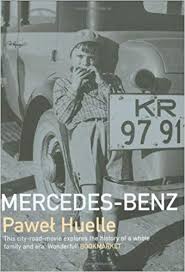Julian Wolfreys and Paweł Huelle at The Quarterly Conversation:
 Gdańsk was a city of the borders for many years, with a prevailing influence of German culture, German music, German language, because even the Polish proletariat when they came from the villages were Germanized, because with the German language they had better chances. But there used to be about 15%-20% Polish speaking people, 3% French people, 2% English people, 3.5% Russians, Scottish people as well, a lot of Dutch people; this was a typical city of the borders. This was over after the Polish partition of 1795. And then Gdańsk, which used to be a rich merchant city, a merchant emporium, became a provincial Prussian city. In the nineteenth and twentieth centuries, these were periods of the great German nationalisms, which end up with the crime of 1939, because most of the Polish people here were murdered at that time. Surprisingly, the Jews could leave. Because this used to be the Free City of Gdańsk, the so-called ‘Free City’, and the authorities of Gdańsk signed an agreement with the Jewish Community in 1939, more or less, perhaps one year earlier, and while the war was still going on, until 1940 the Jewish population was still leaving. So, the multicultural city was over with the Prussian partition. Then, after the war, 99% of the German population left, and Polish people from various parts of former Poland came, from burned-down Warsaw, from Wilno, or from the Eastern borders, from those parts; so, people only came back to the idea of multiculturalism, after 1989, with the end of Communism. But, if ever we speak of multiculturalism in Gdańsk, we speak of the distant past. Of course, it’s a very good example of something to reach for, but it’s a deep past.
Gdańsk was a city of the borders for many years, with a prevailing influence of German culture, German music, German language, because even the Polish proletariat when they came from the villages were Germanized, because with the German language they had better chances. But there used to be about 15%-20% Polish speaking people, 3% French people, 2% English people, 3.5% Russians, Scottish people as well, a lot of Dutch people; this was a typical city of the borders. This was over after the Polish partition of 1795. And then Gdańsk, which used to be a rich merchant city, a merchant emporium, became a provincial Prussian city. In the nineteenth and twentieth centuries, these were periods of the great German nationalisms, which end up with the crime of 1939, because most of the Polish people here were murdered at that time. Surprisingly, the Jews could leave. Because this used to be the Free City of Gdańsk, the so-called ‘Free City’, and the authorities of Gdańsk signed an agreement with the Jewish Community in 1939, more or less, perhaps one year earlier, and while the war was still going on, until 1940 the Jewish population was still leaving. So, the multicultural city was over with the Prussian partition. Then, after the war, 99% of the German population left, and Polish people from various parts of former Poland came, from burned-down Warsaw, from Wilno, or from the Eastern borders, from those parts; so, people only came back to the idea of multiculturalism, after 1989, with the end of Communism. But, if ever we speak of multiculturalism in Gdańsk, we speak of the distant past. Of course, it’s a very good example of something to reach for, but it’s a deep past.
more here.
